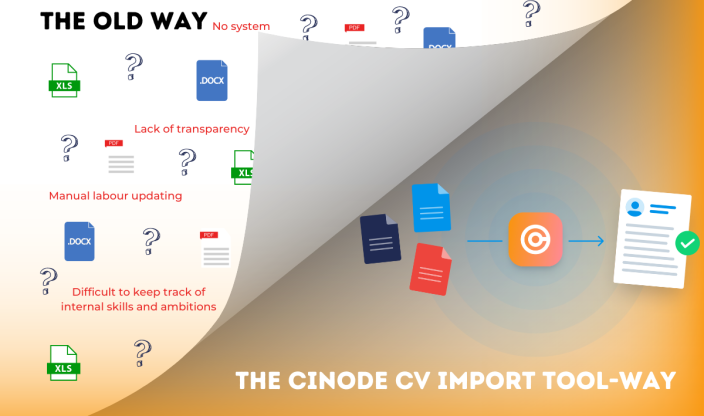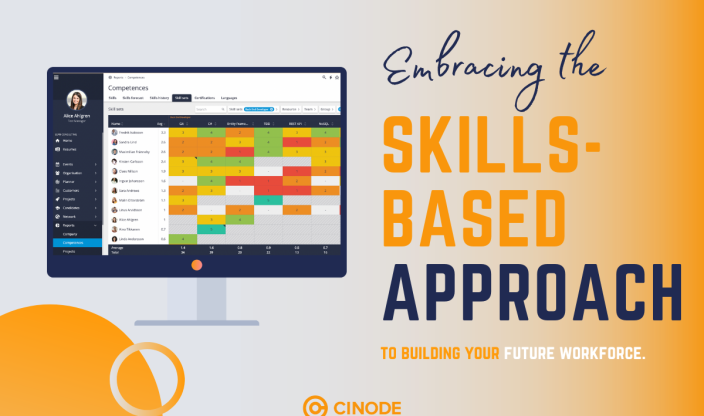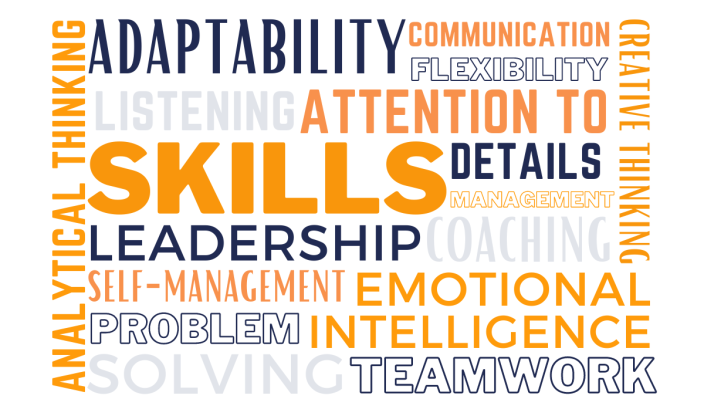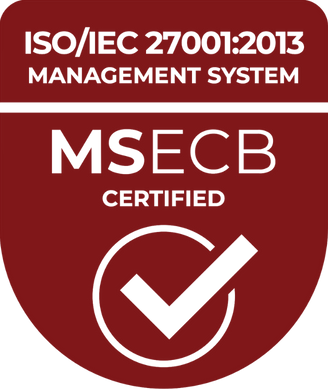Skills mapping – seven smart steps to make you successful

Optimizing growth by making full use of your current skills, while simultaneously identifying your skills gap, you can make the right decisions about upskill, reskill, and recruitment. To succeed, it is important to keep track of the business’ overall competence. First and foremost, you need to conduct a competency survey. Cinode guides you through the whole process.
Globalization, digitalization, and automation are constantly redesigning the labor market, and learning through experience is seen as a matter of course today. Because competence is a constantly fresh product, you need to keep track of your overall competence.
As we have written in previous blog articles, surveys show the value of our current skills will be halved within just a few years. The half-life for a certain type of knowledge thus decreases from 10-15 years to only five years, while in technology the half-life is reduced to only two or three years.
What does this mean? Well, we will need an increasing number of skills to be able to perform our work in the future. In addition, this combined competence becomes your strongest competitive advantage. In other words, it’s worth making a little extra for.
Leading to hidden costs
Nevertheless, many companies lack a strategy for their supply of skills and consequently, this lack makes it impossible to make the skills gap visible. This is a significant challenge that affects all parts of the organization and is indicated, among other things, through expensive and time-consuming recruitment processes. As a leader, it becomes difficult and stressful to strive for good results, and this simultaneously makes employees feel uncomfortable in an organization with obvious skills gaps.

As a manager, you have a central role in supporting your employees’ skills development.
How do you defeat the skills gap?
On the other hand, companies who strive for strong growth, have a good chance of attracting the best talent, this being crucial to the acceleration of growth and for building up long-term competitive power. You see clearly how you can maximize employee occupancy and productivity and which customers and projects you should focus on.
Investing in skills development should be seen as a strategic and necessary investment for long-term sustainable business and not as a burden. As a manager and leader, you have a central role in supporting your employees’ skills development.
Upskill, reskill, and recruitment
Upskilling allows you to reduce the competence gap by developing the employees’ current abilities. It can, for example, be about courses and certifications but also about benefiting from collective learning where colleagues share their knowledge.
Reskilling means you, train employees, for future business needs by developing skills they currently lack but need in the future.
Recruitment is a third way to counteract the lack of skills. However, when you recruit new employees it is important to not only look at your current skills needs but at the same time review your future needs and future market requirements.
Working with external competence, such as subcontractors and partners, is another way of counteracting the competence gap. By proactively building your network with the right skills, you can appoint the right employees to the assignment when the need arises. To optimize growth, you need to use your current skills and identify your skills gap. You can then make the right decision about upskill, reskill, and recruitment.

Competence mapping in seven smart steps
1. Determine the purpose of the company’s competency survey.
2. Make a current situation analysis of the company’s overall competence in regard to Cinode Skills. Allow all employees to make their experiences and future ambitions visible. At the same time, you build both transparency and participation and provide opportunities for personal development in your company. Make a current situation analysis of the company’s overall competence in Cinode Skills.

3. Compile and analyze the result. A complete competence inventory constitutes a stable foundation upon which to make strategic decisions. What does the market demand?
4. The Cinode Skills set function allows you to define a group of competencies you request. For example, this might concern what skills a front-end developer or a project manager will need in your company.
Front-end developer employees could be assigned according to the skills included in the position, after which the employee could rank themselves. Using existing information provides exactly how an individual fulfills your skills set. In addition, you obtain fast information regarding the competence gap. The Cinode Skills set allows you to define a group of skills you request. In this way, you see how personnel fulfill the skill sets and how you can expose competence gaps.

5. Involve your employees. Managers and leaders who actively work with the competence development of employees, strengthen the commitment within the company. Listen to employee ambitions and goals for the future. Cinode Growth Plans help employees to visualize their goals and clearly communicate the same to their managers. A concrete plan allows you to prioritize the time correctly and take the necessary steps required to achieve your goal.

6. Unable to find the necessary competence internally? With Cinode Partner, you build your own ecosystem of subcontractors and partner companies. You can send out assignments to selected partners/subcontractors and reach thousands of consultants in the Cinode Network at the push of a button. What’s more, you obtain a skills inventory covering your subcontractors, just as you do with your employees.

7. Cinode’s competence reports show you all competencies at an individual, group, and company level. This allows you to sort and filter. Additionally, special reports show how competencies in the company have changed over time. The Competence Forecast function shows you how competencies are expected.

Digital tools for competence mapping
Our Nano Education shows you how to make an inventory and gap analysis of your collective competence. Regardless of how you choose to strengthen your skills supply, you will need a system to obtain an overview and study continuity in your work process. Cinode’s leading platform in Skills Management, employing sharp digital tools that facilitate your skills mapping enables you to build competitiveness and increase growth within your company.
Identify which skills you have and which you lack. Make the right decisions about upskilling, reskilling and recruitment.
Mattias Loxi, Co-Founder / CMO
Mattias Loxi, Co-Founder / CMO
You may also like...
All posts
Jun 28 2023 · Entrepreneurship, Skills Management
Bridging the gap between Swedish companies and Polish IT talent

Apr 28 2023 · Cinode News, Skills Management
Easily create customized CVs with Cinode’s CV import tool

Apr 20 2023 · Consulting, Sales, Skills Management
How do you work more skills-based within your company?

Apr 04 2023 · Cinode News, Skills Management
5 Easter eggs for eggstra effective Skills Management

Mar 23 2023 · Consulting, Sales, Skills Management
“If you sell competence, you always need to be on top of how you develop your skill set”

Feb 22 2023 · Skills Management
How can Skills Management help your company?

Feb 16 2023 · Skills, Skills Management
How to identify and recruit transferable skills

Feb 07 2023 · Skills Management
Flying start 2023 – how to succeed with your skills growth plan

Dec 21 2022 · Skills Management
Latest in Skills Management from the past year

Dec 08 2022 · Cinode News, Skills Management
This is how utilization works in Cinode (Video)

Dec 01 2022 · Cinode News, Skills Management
Add the right person to the right role with the right data (Video)

Nov 29 2022 · Skills, Skills Management
